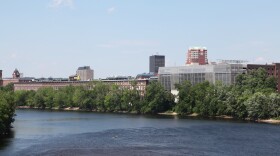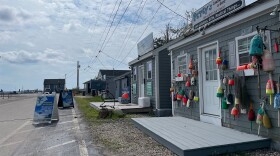New Hampshire fishermen facing cuts and closures imposed on them because of declining fish populations say regulators are putting them out of business. Thursday those fishermen learned that they might get some financial relief. The federal government has declared a disaster in the New England Ground-fish fishery.
This past year there have been a lot of stormy seas for New Hampshire fishermen. Scientists from the National Atmospheric and Oceanic Administration, or NOAA, told them that – even though fishermen were staying within their catch limits – stocks of cod-fish weren’t rebounding from a decade old collapse as quickly as hoped.
NOAA’s new regional administrator John Bullard laid this out in a meeting with New Hampshire fishermen this week.
Bullard: This is not fisherman overfishing, you guys are following the rules, something else is going on out there that we haven’t seen before.
Whether that’s warmer oceans affecting maturation, too many predators, or something else entirely, no-one can say for sure.
But what is sure is that next year fishermen face an 80 percent cut in the number of cod they are allowed to land, and they aren’t happy. Carl Bouchard of Rye says the people who set the catch limits don’t have to live with the results like fishermen do.
Bouchard: those people still got their jobs, most of them have got a good retirement plan, some of them even got a raise. Who’s accountable? The fishermen are the only ones who are held accountable for something they didn’t do!
Fishermen feeling punished for things beyond their control was a theme in the meeting between the regulator and the regulated this week.
Gill net fisherman Jay Driscoll’s hands shook as he handed three devices called "pingers" to NOAA administrator Bullard. Fishermen are required to hang "pingers" on their nets to keep harbor porpoises from getting caught in them.
Driscoll: Two of these pingers are working, one isn’t. Maybe you could tell me which one because you’re a very educated man I’m sure you can figure out which one is working and which one isn’t.
Bullard: huh. I don’t have a clue
Driscoll and other fishermen couldn’t tell either, which is perhaps why over the past two years, too many porpoises have wound up in their nets. Because of that NOAA is shutting down the gill net fishery for October and November, the two most profitable months of the year.
Driscoll says, this closure would mean he wouldn’t be able to make his mortgage payments.
Driscoll: I have no problem with NOAA coming down and making sure I am compliant with every one of these things that goes on my net. I’d rather you throw me in jail than have this kind of closure put on me right now.
As of 2011 were only 52 active ground-fishing boats left in New Hampshire. The fleet has been losing about five boats a year since 2007. They fish for cod, haddock, halibut and yellow-tail flounder, among others.
The fishermen who are left say that the quota cuts and closures could be the final nail in the coffin of the New Hampshire fishing fleet. That’s why during the last ten months the governors of six Northeastern states have been asking Congress for $100 million dollars in disaster relief funds. And just this week, the feds have granted that declaration.
Smullen: So what that means is that it allows Congress to appropriate money to alleviate the financial hardships that the fishermen are facing because of the fishery disaster.
NOAA spokesman Scott Smullen says unlike a FEMA disaster declaration, there is no pot of money already waiting for a failed fishery. So it’s up to the New England delegation to help Congress find those $100 million dollars.
But after this one time shot of money is done, will Granite State Ground fishermen be able to hang on?
NOAA administrator John Bullard says that all depends on rebuilding fish stocks.
Bullard: Fish and fisherman. Every day we’ve got to have fish and fisherman. That’s the way I look at it. Any day we wake up and we don’t have fish and fisherman, you know it’s time to go home.
If a year of drastically reduced fishing doesn’t bring the cod and other fish back, or if the fisherman can’t hold on despite disaster funds, New Hampshire’s waterfronts may start to get a very different look and feel.









